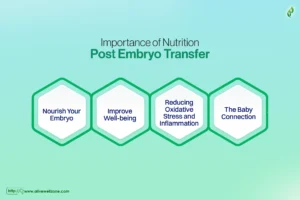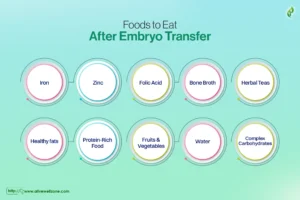Last Updated on November 8, 2024 by Helena Akter
Excitement and anticipation fill your mind after the embryo transfer. And it’s obvious! But alongside these emotions, you need to take care of your body. And with that, you must know the right foods to eat post embryo transfer.
So, you can eat carrots, beetroot, whole grains (like brown rice and quinoa), fish (especially fatty fish like salmon), cheeses, milk, and avocados. Remember to stay hydrated by drinking plenty of water. Herbal teas, especially warm ones, can also soothe your body and mind.
Remember, making mindful food choices creates an optimal pregnancy environment. We’ll also explore the foods you need to avoid and the importance of hydration after your embryo transfer. So, keep reading.
Importance of Nutrition Post Embryo Transfer
When talking about what to eat after egg transfer IVF, you must pay attention to your nutrition post-embryo. Your diet plays a significant role in supporting embryo implantation and growth.
Here’s how you can optimize your diet for the best chances —

Nourish Your Embryo
The days after an embryo transfer are vital. During this time, a well-balanced diet filled with important nutrients can create the perfect environment for the embryo to implant and grow.
You can think of it like giving your “seed” the best “fertilizer” to thrive.
Improve Well-being
IVF can be physically and emotionally demanding. So, you should prioritize nutritious foods to strengthen your immune system, strengthen your immune system, and support a healthy pregnancy.
Reducing Oxidative Stress and Inflammation
Research shows that specific vegetables and fruits can reduce oxidative stress and inflammation. These factors can negatively affect fertility. To create a supportive environment for your embryo, eat anti-inflammatory nutrients.

The Baby Connection
Even before pregnancy is confirmed, your nutrition choices matter. When you nourish your body during IVF, you’re also nurturing a connection with your little one. It’s a mindful approach that makes you feel good and builds your bond with your child.
Foods to Eat After Embryo Transfer
Knowing what to eat after IVF transfer is important to support your body and increase pregnancy success. Here, eating the right nutrients can help.
Here are key nutrients to focus on —

1. Iron
Iron is the perfect nutrient! It helps synthesize hemoglobin, which oxygenates tissues—including those in your reproductive system. According to studies, women are particularly susceptible to a deficiency of iron, which can lead to anemia.
To maintain healthy iron levels, include these foods in your diet —
- Spinach
- Pumpkin seeds
- Carrots
- Beetroot
- Jaggery
Remember, nourishing your body with the right nutrients sets the stage for a healthy pregnancy.
2. Zinc
Zinc is vital for balancing hormone levels. Along with that, it’s important for reproduction. In fact, a deficiency in zinc can lead to serious pregnancy complications such as fetal growth issues, miscarriage, and placental dysfunction.
So, make sure to incorporate zinc-rich foods like —
- Nuts
- Dairy products
- Grains
- Potatoes
- Meat
If you aren’t getting enough zinc from your diet, you may want to take a zinc supplement.
3. Folic Acid
When you’re on this exciting journey of embryo transfer, it’s crucial to think about what you’re putting into your body. Folic acid is like a superfood for your baby’s spinal cord and brain development.
Without enough of it, there’s a risk of neural tube defects. So, let’s talk about some tasty ways to get your folic acid fix —
- Green leafy vegetables
- Beans
- Rice
- Eggs
- Legumes
- Citrus fruits
- Asparagus
4. Bone Broth
Now, let’s talk about bone broth. It’s like a warm hug for your insides, especially during this critical time. Here’s why it’s so great —
- Amino Acids
- Collagen
- Nutrients Galore
- Gut Health
- Immunity Boost
5. Herbal Teas
Warm foods after embryo transfer like herbal teas can really help. For instance, red raspberry leaf tea has iron, Vitamin C, Vitamin E, and potassium. These nutrients support implantation.
In fact, people in Europe have used it for gynecological issues for ages, and there’s some anecdotal evidence it helps with fertility too.
Another good option is green tea. A 2018 review suggests herbal teas might reduce oxidative stress and support fertility. However, always talk to your healthcare provider before adding herbal teas to your diet. Besides, some teas can interfere with medications.

Also, ask which teas are safe to drink after you get a positive pregnancy test. This way, you can ensure the best outcome for you and your baby.
6. Healthy fats
When you’re on the IVF journey, you must pay attention to what you eat. That’s because healthy fats help in storing energy and improving your overall well-being.
Here’s how you can make the most of them —
- Polyunsaturated Fatty Acids: These can significantly increase fertility and the quality of your oocytes (egg cells) and embryos.
- Trans Fats: Unfortunately, these aren’t your friends. Trans fats affect your fertility by raising insulin levels!
Now, let’s talk about the good stuff. Here are some healthy fat sources you should definitely include —
- Fish (in particular, salmon)
- Olive Oil
- Walnuts
- Flaxseed Oil
- Chia Seeds
However, speaking about after IVF transfer what to eat, avoid trans fats. They hide in cookies, frozen pies, cakes, snacks, and fast foods.
7. Protein-Rich Food
Proteins are like the builders of your baby’s development. They’re important, but let’s keep it balanced —
- Again, fish
- Tofu
- Milk
- Cheese
- Legumes
- Beans
- Nuts
- Sprouts
While proteins are vital, remember to consume eggs and red meat in moderation to maintain a balanced diet.
8. Fruits and Vegetables
After embryo transfer, your body needs all the good stuff to thrive. Fruits and veggies are like little superheroes, packed with antioxidants and detoxifying magic.
Here’s your personalized grocery list —
- Avocados
- Beans
- Spinach
- Peas
- Broccoli
And now, the fruity group —
- Oranges
- Dates
- Berries
- Pineapple
9. Water
Staying hydrated is super important during the IVF and conception process. So, you must drink at least two liters of water a day or half your body weight in ounces. Other fluids like milk or juice can also count towards your daily intake.
Water is especially vital if you’re taking medications or supplements. Start your day with a glass of warm water with lemon and a pinch of sea salt. It improves your immunity, helps with digestion, and maintains your mineral levels.
These are important for hormone production!
10. Complex Carbohydrates
We all need complex carbohydrates for lasting energy and stable blood sugar levels. In fact, these are key for your overall health and pregnancy wellness.
Try to include —
- Whole grains (like quinoa, brown rice, oats)
- Millet
- Fruits
- Vegetables
- Legumes
These foods give you the energy and nutrients needed for a successful pregnancy.
Foods to Avoid After Embryo Transfer
After an embryo transfer during IVF, the best way to support implantation and early pregnancy is to eat right. While you don’t need to avoid specific foods entirely, some dietary habits can help your overall well-being.
Here are a few tips —
- Caffeine: Limit or avoid caffeinated drinks. Too much caffeine might have negative effects on implantation.
- Alcohol: Stay away from alcohol during the two-week wait period. It reduces risks to the developing embryo.
- Salt: Cut down on salt. High salt intake can raise blood pressure and cause inflammation. You can use spices and herbs to flavor your food instead.
- Processed and Junk Foods: Avoid processed foods. They are usually high in unhealthy fats, sugars, and additives. Stick to a balanced diet.
- Spicy Foods: Spicy foods aren’t strictly off-limits, but they can cause stomach discomfort for some people.
Don’ts After Embryo Transfer
Along with things to eat after embryo transfer, there are certain things you should avoid to ensure the best outcome. Here are some key guidelines —
- Avoid high-impact exercise like running or walking. They can be too strenuous.
- Don’t lift heavy objects as these things can strain your body too much.
- No saunas or hot baths because they can raise your body temperature too much.
- Avoid applying heat to your abdomen. However, if you need warmth, use a heating pad on your lower back instead.
- Stay away from certain foods like shellfish, blue cheese, unpasteurized dairy, uncooked meats, sushi, and processed meats.
- Don’t take a pregnancy test too early because testing too soon might give you a false negative result.
Hydration and Its Impact on Embryo Implantation
Water is vital for your body, contributing to ⅔ of an adult’s body and nearly 80% of a newborn’s body. It’s important for digestion, temperature regulation, and transporting nutrients. Staying hydrated helps your body work its best, which is key for conception.

Here’s how hydration supports fertility —
- Hormonal Balance: Drinking enough water keeps your hormones balanced. It’s vital for regular menstrual cycles and ovulation. When you’re dehydrated, your hormone production can be disrupted, leading to inconsistent cycles.
- Cervical Mucus Quality: Hydration improves the consistency of your cervical mucus. It’s important for sperm transport and successful conception.
- Sperm Health: For men, staying hydrated is vital for maintaining sperm quantity and quality. In fact, dehydration affects fertility by reducing sperm production and motility.
- Uterine Health: Proper hydration promotes good blood flow to the reproductive organs. It creates a healthy environment for implantation and fetal development.
IVF Success Tips Diet
For IVF success, following a healthy diet is vital. It’s not just about what you eat, but how you approach eating.
Here are some key tips to improve your IVF diet plan —
- Eat mindfully, slowly, and enjoy each bite.
- Stay away from foods that cause indigestion or allergies.
- Drink plenty of water throughout the day. Hydration is key.
- Eat regularly to keep your energy levels up.
- Follow Your Doctor’s Meal Plan
- Stick to the meal plan recommended by your healthcare provider.
- Make sure your diet includes all necessary nutrients.
Final Words
In conclusion, we’ve covered a lot about foods to eat post embryo transfer and the importance of nutrition. First off, your diet plays a crucial role in supporting that little embryo. You can create a perfect environment for it to settle by getting enough iron, zinc, folic acid, and healthy fats.
Now, here’s the deal: stay hydrated. Water is your best friend. And when it comes to food, kindly be selective. On top of that, skip the caffeine and those sneaky trans fats. They won’t help you in any way.
As we move forward, keep these guidelines in mind. They’re not just about IVF success; they’re about giving your future baby the best start possible.
FAQs
What should you eat after embryo transfer?
You should eat lean meats like turkey and chicken, chickpeas, cottage cheese, fish, dairy products, eggs, legumes such as lentils and beans, seeds, and nuts. Focus on whole, unprocessed foods to support a healthy pregnancy.
Should I consume warm foods after embryo transfer?
Yes, you should eat warm foods rather than cold foods to enhance blood flow to your uterus. Also, wear warm clothing to keep your abdomen warm and, if possible, have someone accompany you to the IVF clinic.
Can I eat bananas after embryo transfer?
No, you can’t eat bananas after embryo transfer. They are high in sugar, which can cause an unwanted spike in blood sugar levels, making embryos unsuitable for implantation.
Is milk good for embryo transfer?
Yes, milk is good. Even research suggests that one or two servings of full-fat dairy daily can benefit ovulatory function and fertility. High-fat dairy foods may decrease the risk of anovulatory infertility, making them a healthy choice after embryo transfer.
Can I eat apple after embryo transfer?
Yes, you can eat apples after embryo transfer. Apples are fiber-rich fruits and are often recommended due to their high nutritional value, which supports a healthy pregnancy.
Can I eat potato and rice after embryo transfer?
Yes, you can eat potatoes and rice after embryo transfer. Focus on whole, unprocessed foods like sweet potatoes and brown rice over refined options like white potatoes and white rice. These provide complex carbohydrates, fiber, and essential nutrients for a healthy pregnancy.

